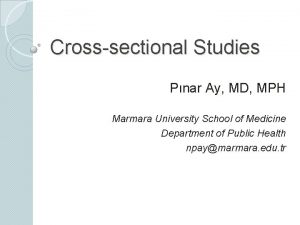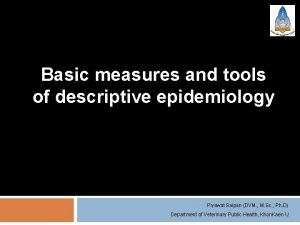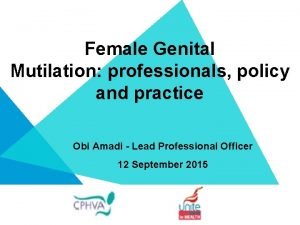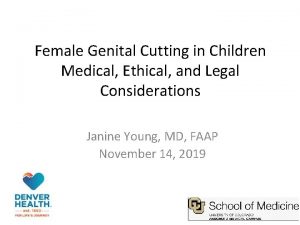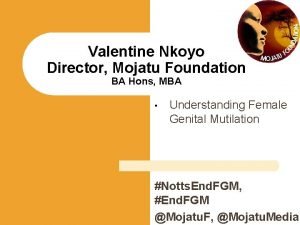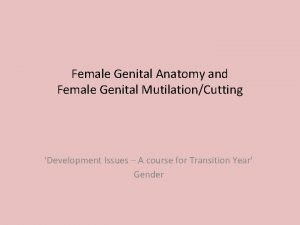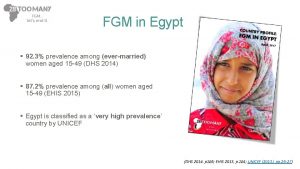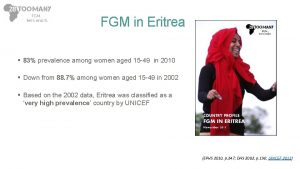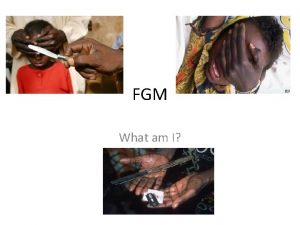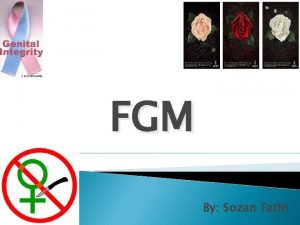FGM in Egypt 92 3 prevalence among evermarried












- Slides: 12

FGM in Egypt § 92. 3% prevalence among (ever-married) women aged 15 -49 (DHS 2014) § 87. 2% prevalence among (all) women aged 15 -49 (EHIS 2015) § Egypt is classified as a ‘very high prevalence’ country by UNICEF (DHS 2014, p. 186; EHIS 2015, p. 184; UNICEF (2013), pp. 26 -27)

Where? Highest FGM prevalence: Upper Egypt = 92. 1% Lowest FGM prevalence: Urban Governorates = 74. 5% © 28 Too Many (EHIS 2015, p. 104)

Where? FGM Prevalence in Rural Areas: § 92. 6% of women aged 15 to 49 years § 15. 9 % of girls aged 1 to 14 years FGM Prevalence in Urban Areas: § 77. 4% of women aged 15 to 49 years § 10. 4% of girls aged 1 to 14 years (EHIS 2015, pp. 104 & 106)

Why? § Tradition – family and community ties are strong in Egypt, and greatly influence decision-making, including whether or not to continue practising FGM. § Religion – 50. 1% of men and 46. 2% of women believe that FGM is required by their religion. § Fidelity/Virginity and Marriage prospects – 48. 7% of men and 43. 1% of women believe FGM prevents adultery. (EHIS 2015, pp. 110 -114)

Age & Type of FGM § FGM is usually performed in Egypt between birth and 17 years of age § Most girls are cut at or before puberty § Girls are cut at a younger age in Upper Egypt § Unconfirmed reports that age of cutting is lowering § FGM Types I and II are most common § FGM is usually performed in May and June (EHIS 2015, p. 107)

Is FGM Declining in Egypt? Secondary analysis of DHS data on Egyptian girls aged 0 – 17: % of girls who had already undergone FGM + % of girls likely to undergo FGM before reaching 18 years of age 69% in 2005 55% in 2014 (Dr Fatma El-Zanaty, UNICEF (2015), pp. 2 -3)

Law § 2008 – FGM outlawed in Egypt § 2014 – New Constitution requires that the state protects women from all forms of violence § Between 2007 and 2013, several girls died undergoing FGM, including Soheir al -Batea § 2016 – amendment to Penal Code, making FGM a felony and increasing penalties

Understanding & Attitudes Overall, 53. 9% of women and 58. 5% of men (aged 15 -49) believe that FGM should be continued in Egypt. § Young women are more likely to say that FGM is necessary than young men. § Less-wealthy and less-educated young people are more likely to support the practice than those who are wealthier and better educated. § There is a high level of misunderstanding throughout Egypt about sex and FGM, including a lack of knowledge in the health sector. § An absence of good-quality sex education in schools, in the home and through religious leaders contributes to the continuation of FGM. Most at risk: girls living in rural areas, particularly Upper Egypt, who are from poorer, less-educated families. (EHIS 2015, pp. 110 -111)

Medicalisation of FGM Since at least 2008, move away from traditional practitioners towards health professionals: § 78. 4% of incidences of FGM are performed by a health professional § Most common in urban areas § Doctors are ‘trusted’ and seen as less likely to be punished for performing FGM § Economic incentive to perform FGM, particularly in rural areas § Currently no law stating that FGM is medical malpractice (draft law under consideration) (EHIS 2015, p. 107)

Anti-FGM Campaigns § Government level – National Council for Childhood and Motherhood and National Council of Women § UN Joint Programme § International NGOs § National NGOs § Faith-based organisations § Coalitions and working groups § New ‘NGO Law’ – a concern for future partnerships and funding

Challenges Moving Forward ü Tackling ongoing community pressures, traditions and beliefs about religion and FGM ü Clarifying misunderstandings around sex and FGM through accurate sex education ü Ongoing problem of medicalisation of FGM throughout Egypt, despite laws forbidding it ü Lack of knowledge and misunderstandings among medical staff about FGM ü Accessibility to healthcare, especially for women in rural areas and those without funds to pay ü Implementation and enforcement of anti-FGM laws, including educating and supporting justice agents such as police and judges ü Educating and maintaining influential leaders and role models, especially religious leaders

Challenges Moving Forward ü Strengthening the holistic approach to build trust and include all members of the family and the wider community ü Potential decline in press freedom making dissemination of information more difficult ü Obtaining comprehensive and reliable data ü Changing political climates and the ongoing threat of re-emerging support for FGM ü Potential difficulties forging future partnerships and obtaining funding (especially international), which is under threat from the new Egyptian ‘NGO law’ ü Efficient coordination between the Government and civil society is essential with mutual agreement on the most effective ways to end FGM ü Strengthening of existing NGO coalitions and working groups, and ensuring the security and physical safety of all those working in country to end FGM
